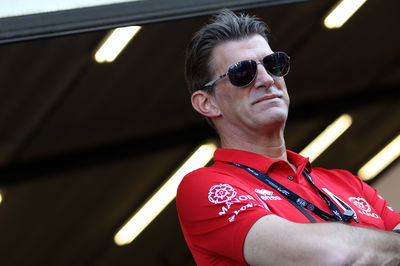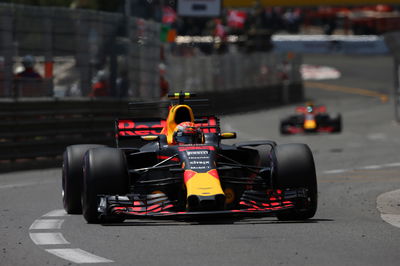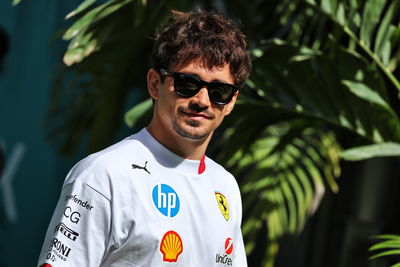Minding Your Manors: Graeme Lowdon on life after F1

By Luke SmithFollow @LukeSmithF1 on Twitter
"They're starting early!"
A smirk breaks across my face as I spot a gaggle of Belgians queuing up at a beer stall in the paddock at Spa ahead of the FIA World Endurance Championship race. Many have already taken a seat at benches just yards from the team trucks in the cramped paddock. The empty cups are already beginning to tot up on the tables. The smell of frites and waffles hangs in the air as fans tuck into their treats while watching a support race on the big screen, turning their gaze to Eau Rouge, which can be spotted through the trees.
It's just gone 10 in the morning, and yet they're already in full swing, preparing for a long day of racing.
As locations to conduct an interview go, this is one of the more relaxed I can remember. And my subject seems similarly at ease as we perch on one of the benches. You wouldn't think the team he runs is just hours away from one of the most significant races of the season - Spa being the prelude for the 24 Hours of Le Mans - let alone that he has been an important figure in F1 for a number of years.
But for Graeme Lowdon, life in WEC has become the norm. Since parting company with Manor's F1 operation at the end of 2015, along with long-term colleague John Booth, Lowdon took the British racing marque into the WEC's LMP2 class with a two-car effort. After spending year one embedding itself in the paddock and the championship, Manor is now looking to move onwards and upwards through season two.
"We're getting there," Lowdon says. "We're learning more and more. We said this a year ago, when you come into a championship for the first time, you've got a lot of respect for the other teams that have been doing this for a long, long time.
"Our first target last year was to gain the respect of the pit lane and hopefully we've done that. We've shown we can prepare the cars to a good standard and we can get the cars going quick as well. We're working with some very good drivers as well. It's starting to feel more familiar.
"Endurance racing is such an enormous challenge. You're always learning. We've always said, our target is to learn and the key thing is we want to be quick learners. We want results as well."
The prospect of completing races either six or 24-hours long with more gaps in the calendar is quite the diversion from F1, yet for Lowdon and Manor, adapting to the WEC way of life wasn't too much of a challenge given their deep experience at all levels of racing.
 |
"I think we've raced in a lot of formula before, Formula Renault, Formula 3, Formula 1, and now the World Endurance Championship," Lowdon notes. "You very quickly work out who the racers are. The paddock has a great feel about it. The championship is extremely well promoted, it goes to some great places, as does Formula 1 as well.
"There are an awful lot of similarities as well. Obviously certain things are different. I've got huge respect for both championships and still stay in touch with what's happening in Formula 1."
The pinnacle of the WEC is its LMP1 class, which currently showcases racing giants Toyota and Porsche battling for supremacy. Following the withdrawal of Audi at the end of last year, the class has dwindled to just six cars for Le Mans - and may stand at just four by the end of the season - leading to a push from WEC chiefs to try and boost grid numbers in the top line class.
Manor has been linked with a deal with customer Ginetta chsasis for 2018, giving it the chance to move up to the top table in the WEC. The attraction of a LMP1-L programme is clear for Lowdon - but it is something he will only act upon if the conditions are right.
"P1 has a natural interest for us because of what we've been doing," Lowdon recognises. "For the last six or seven years, we were designing, building, testing our own racing cars. At the moment, in P2, we race cars but we don't design or build them.
"P1 is a natural fit, but we've always said that we can only go and do it if we can create the commercial model around it. We have absolute belief that we have the ability to run a P1 programme, because we've run a Formula 1 programme and there's an awful lot of similarities between the two.
"The question is can we build a commercial model, and that's still not clear for 2018, because there are still so many uncertainties about where the championship is going to be, what the regulations will look like, just how it's going to be. It's certainly something that is of high interest for us."
Time may appear to be ticking for Manor if it wants to make a decision to move up to LMP1 for 2018, yet as Lowdon notes: "In the past we've done quite a few things in a short space of time!"
 |
It was the revival of the Manor team after its heartbreaking collapse at the end of 2014 that makes a move up to LMP1 seem like child's play by comparison. Lowdon knows the challenge of running a team to a tight budget and in a fluid environment, having entered F1 in 2010 with Virgin Racing under the premise of the cost cap that never came to be.
Such challenges offered Lowdon a hindsight and understanding that help when it comes to running a team in a relatively new championship such as the WEC, which was only formed in 2012.
"I think the key thing is to have a focus on growth," Lowdon says of the series. "Without any question, to me that's the most important side of the equation is if a championship is growing, commercially growing, then it can sustain a higher cost base. But also make sure that costs are taken seriously and not overlooked.
"Usually when a championship ends up in problems is when people completely overlook the cost. So 'sustainable growth' has got to be the sort of two watch words of where the championship goes.
"Gerard [Neveu, WEC CEO] is extremely commercially aware. You look at how much the championship has been growing. We just need to see more of that and keep building on what is already a really good product."
As Lowdon previously mentioned, despite the WEC being his primary championship of interest, he still keeps a close eye on how things over in Formula 1, which is currently going through a series of changes under new owner Liberty Media. Lowdon is impressed by what he's seen from Liberty so far, particularly when it comes to long-term planning and strategy - something he feels the sport has been severely lacking in recent years.
"I met up with Ross [Brawn] earlier out in Barcelona testing, and he talked through some of the plans and I think they're extremely sensible," Lowdon says. "The key thing is, and it is something that I certainly used to raise a lot when we were involved with the Formula 1 Commission but not the Strategy Group, was the thing that was always missing was the strategy.
"I don't mean that in a glib way. Every business I've run, we've had some kind of explicit strategy and an underlying growth plan. That was really the thing we could never have sight of in that period in Formula 1, of 'what is the growth plan and is it consistent with the individual plans of the different teams?' because they are so very, very different."
With so many different plans and priorities in play throughout the F1 paddock, Lowdon is hopeful that Liberty will cater to the many, not just the few, and recognise the varying perspectives of its partners.
"Hopefully the main thing from what I can see is that they've been putting together a growth plan, and then ensuring that that's consistent with the various requirements of the different people who are involved, whether it's the teams, promoters, rights holders, that whole thing," Lowdon says.
"Because I think in the past there was just way too much focus on very, very short-term tactical things. Thankfully I wasn't involved when they came up with that qualifying idea in 2016. It was nonsense, and you could see it was going to be nonsense..."
Did the infamous elimination qualifying saga sum up the political mess F1 had got itself into?
"I think so yeah," agrees Lowdon. "Because it was completely obvious to anyone on the outside that it wasn't consistent with half of the things that teams wanted or fans wanted. It just didn't make any sense. Maybe it took a few things like that for people to realise that having a clear framework and a long-term plan actually does have some value.
 |
"There is a place for long-term planning. There's a place for short-term tactics as well. There's a place in all businesses. I remember sitting in an F1 Commission meeting and we were all asked to suggest one thing, and there were a lot of tactical-type things suggested. My suggestion was a five-year growth plan. Why not? To me, there seems to be a shift towards that, and that's a good thing for everyone involved."
While Lowdon is impressed by Liberty's early movements since taking over the reins of F1 in January, he stresses that the core change is not about people. Be it Ross Brawn, Sean Bratches, Chase Carey or Bernie Ecclestone running F1, to him, it is not as important as another shift that has taken place in recent months.
"The single biggest change is when you have a change of ownership is a change of objectives," says Lowdon. "The objectives of the previous ownership, so not the people managing it but the owners, wasn't necessarily clear to the fans. I'm absolutely convinced that whatever that objective was, Bernie would have been delivering on it, because Bernie delivers stuff.
"I think there's no point trying to do a comparison, because fundamentally there's a different remit, different job, different objectives. I'm fairly convinced that if Bernie had been told 'deliver X', whatever X is he would have delivered it. If it was Y, he'd deliver Y. And so I think there are probably a lot of things that happen now that Bernie will have been very happy to implement if it had fitted the remit that he had.
"That said, Ross is world-class at what he does, and he's got the respect of the teams at the highest level. There's no real question marks there in terms of ability."
Sustainability has been a key issue in motorsport for many years, but particularly in F1. The last embers of the old Manor F1 operation - the last of the three 'new' teams from 2010 - burned out at the start of the year when Manor Racing folded. But in Lowdon's eyes, this was not a result to the commercial structure of F1.
 |
"My own view was that Manor had every chance of surviving in any case," Lowdon says. "Nothing changed in their commercial model. A few years ago, we had to navigate some very difficult things because we'd signed up for one commercial landscape and then instantly it was changed. But it's been quite stable the last couple of years. There has been no change in the prize structure, no change in everything.
"So I was extremely disappointed to see MRT go because I knew a lot of people who worked there and they are really good people. I think it was a real, real shame that happened. I'm not really sure why, because as I say, the structure was there. It was quite a clear one. I think it's a shame.
"I think F1 is worse off without. I think it needs probably a dozen teams to give it the depth and colour and everything else like that."
So how does F1 go about boosting grid numbers and getting more small teams involved in racing? For Lowdon, it comes back to strategy and clarity.
"An absolute clear, commercial landscape with stability to allow people to plan" is what Lowdon believes is needed for F1. "Our job of managers is not to let things just happen of their own accord. It's to manage a situation. We had some real extreme changes, whether it was new engines or removal of cost cap and RRA [Resource Restriction Agreement] that was never adhered to. All manner of changes that were incredibly difficult.
"Thankfully, that's disappeared now. The last two years have been extremely stable. Everyone knew what the rules were, what the prize money is. It just needs to be the same as that.
"There's an awful lot than can be done to promote the sport to a wider audience still and get fans more engaged. I've always said that Formula 1's biggest asset is the fan base, bigger than any particular team even. All of that requires some attention. They've got people in there now looking at it.
"I think Formula 1 still has a huge attraction. I'm a racing fan. I love World Endurance Championship, I love Formula 1 as well. Both as a fan and commercially, I find it very attractive."
 |
Would Lowdon therefore consider taking the Manor name back into Formula 1 one day?
His answer is immediate: "Yes. I spent a lot of years learning it!"
As a realistic aim on Manor's radar, though, Lowdon admits there would be a lot that needs to fall into place for an F1 return to happen. Nevertheless, he remains open to anything that comes along, so long as it's commercially viable and has potential.
"At the moment, one of the things is there's a lot of change happening in all the championships," Lowdon says. "There's a natural break in the Formula 1 contracts in 2020. That's only a couple of years away and it's not that easy to build a complete commercial model around a short space of time.
"One thing is clear: we're always looking at options and opportunities as anyone who runs a business should be. If the opportunity's right and we think we can build something sustainable and at the right level, then we definitely would."
Manor has always a habit for doing things both quickly and efficiently. Opportunities in motorsport are often fleeting, yet with so many years of experience in racing, you can be sure that Lowdon would be able to pounce on something viable if the chance to return to F1 arose.
And much like the Belgian fans who sat nearby sipping on their Leffe beer in the lead-up to lights out on that warm Saturday at Spa, preparation - and, more importantly, strategy - has always been key for Manor.
It is an approach that will serve Lowdon and his team well whatever paddock they may find themselves racing in.











